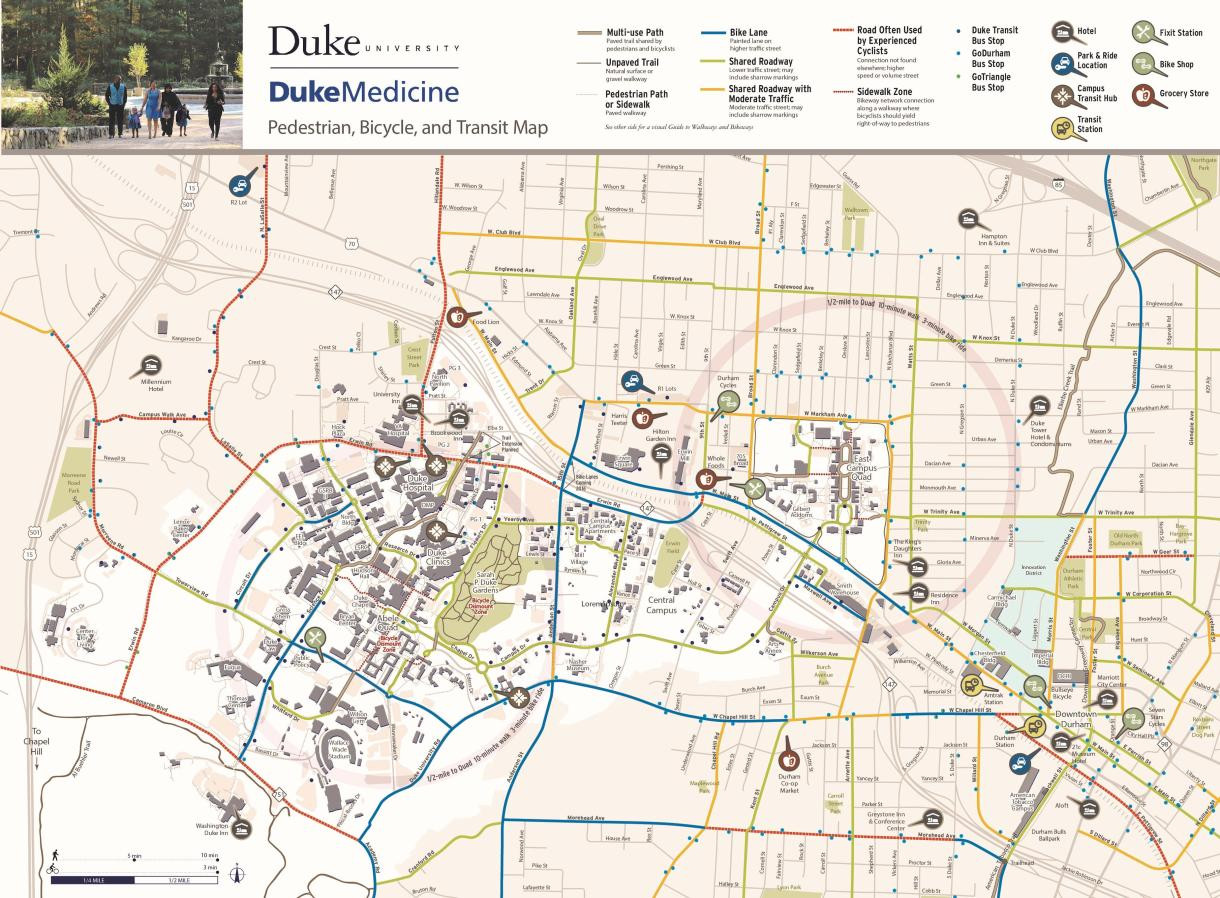Bicycling at Duke University isn’t just a great way to stay fit; it’s a practical and enjoyable way to navigate campus. Whether you’re a student rushing to class, a faculty member heading to a meeting, or staff enjoying a lunch break ride, Duke makes cycling accessible and convenient. With ample bike parking facilities strategically located near buildings, you can easily integrate biking into your daily routine at Duke.
 Duke Medicine Pedestrian, Bicycle, and Transit Map
Duke Medicine Pedestrian, Bicycle, and Transit Map
Navigating Duke by Bike: Operational Guidelines
To ensure a smooth and safe biking experience for everyone, Duke University has established some operational guidelines for cyclists. It’s important to be aware of these to contribute to a pedestrian and bike-friendly campus environment.
Dismount Zones and Bike Parking Regulations
Certain areas within Duke’s campus are designated as bicycle dismount zones. These pedestrian-heavy areas, such as the iconic Abele Quad, the bustling Bryan Center Plaza/Brodhead Center Plaza, and the serene Duke Gardens, require cyclists to dismount and walk their bikes. These zones are implemented to prioritize pedestrian safety and maintain the flow of foot traffic in these central locations. You can refer to Duke Today’s announcement for detailed information on dismount zone boundaries.
Beyond dismount zones, Duke University also has specific bike parking regulations in place. When you’re not actively cycling, your Duke Bike, whether it’s your personal ride or a bike-share option, must be securely locked to a designated bike rack or stored immediately adjacent to it if the rack is full. It’s crucial to ensure your bike is not obstructing pedestrian walkways or vehicular traffic.
Prohibited Parking and Security Measures
Parking your Duke bike against trees, handrails, signs, landscape features, or chaining it to anything other than a designated bike rack is strictly prohibited. Bikes found improperly parked or abandoned anywhere on campus are subject to confiscation. Owners of confiscated bikes will incur fines and daily impound fees. To minimize the risk of theft, Duke University strongly recommends using U-locks over less secure chain or cable locks. U-locks offer a higher level of protection for your Duke bike, providing peace of mind while you are on campus.
Duke Bike Registration: Benefits and How-To
Registering your Duke bike with the university Parking and Transportation Services is highly recommended, especially if you plan to park your bike on campus regularly. Bike registration offers several valuable advantages for Duke cyclists.
Advantages of Bike Registration
Registering your Duke bike acts as a deterrent to potential thieves. Registered bikes are statistically less likely to be targeted for theft. Furthermore, in the unfortunate event of theft, a registered bike significantly increases the chances of recovery. The registration information aids Duke authorities in identifying and returning recovered bikes to their rightful owners.
Beyond security benefits, registering as a bike commuter at Duke unlocks additional perks. Full-time registered bike commuters are eligible for up to three free daily parking passes each month. These passes can be invaluable on days when driving to campus becomes necessary. For those who cycle to campus for fitness, registered bike commuters have access to shower facilities at various locations across Duke. Remember to carry your DukeCard to access these facilities. A map of shower locations is available here.
Duke bike registration also extends to off-campus benefits through partnerships with local and national programs. Enjoy discounts at popular local businesses like Bull City Burger, Jamba Juice,, and Bullseye Bicycle through Duke’s participation in the Bicycle Benefits program. For Duke employees, commuting by bike can be even more rewarding. Track your bike commutes at ShareTheRideNC.org and earn gift cards through the GoPerks program.
Ready to Register Your Duke Bike?
The Duke bike registration process is straightforward. You will need your bike’s serial number to complete the online registration form. Having your serial number readily available will expedite the registration process.
Additional Duke Cycling Resources
Duke University provides a comprehensive network of resources to support cyclists on campus, making biking a convenient and hassle-free transportation option.
Bike Repair Stations: Fix-It Stations on Campus
For minor bike repairs and maintenance on the go, Duke has strategically placed 5 Fix-It Repair Stations across campus. These stations are equipped with a bike stand to securely hold your Duke bike during repairs, a range of essential bike-specific tools, and a universal air pump compatible with both Presta and Schrader valves. Each station also features a QR code linking to online bike repair guides, providing step-by-step instructions for common repairs.
Bike Purchase Options in Durham
If you’re looking to acquire a Duke bike, Durham offers various options for purchasing both new and used bicycles. For new bikes, consider exploring local bike shops in Durham. For budget-friendly options, the used bike market in Durham provides a range of choices.
Duke Bike Safety Guidelines
In North Carolina, bicyclists are legally recognized as having the same rights and responsibilities as drivers of motor vehicles. This means Duke bikers are permitted to ride on streets and are expected to adhere to all traffic laws, signs, and signals. Responsible biking practices are essential for campus safety. Always use hand signals to indicate turns and be mindful of pedestrians, yielding to them as necessary. Wearing a helmet is strongly recommended for every Duke bike ride, regardless of distance or route. For more comprehensive bike safety tips, resources are available online and through Duke Parking and Transportation Services.
Abandoned Duke Bikes: Confiscation Policy
Duke University bike racks are intended for daily parking needs, with the exception of racks located at campus residence halls, which accommodate longer-term parking for residents. Bikes left unattended outdoors for extended periods, particularly over the summer break, are considered abandoned and are subject to confiscation by Duke University. Throughout the year, Duke Parking and Transportation Services conducts abandoned bike collection drives. While Duke University takes precautions during the removal process, it assumes no responsibility for damage to bike locks, accessories, or the bike itself during confiscation and storage. If you believe your Duke bike may have been confiscated, contact Parking and Transportation Services at 919-684-7275 or [email protected]. Confiscated bikes are held for a minimum of 60 days. Unclaimed bikes are then donated to local charitable organizations.
Duke University Bike Policy Disclaimer
Duke University assumes no liability or responsibility for damage to or theft of any bicycle parked on or in operation on the Duke campus or properties leased by Duke University.
This guide provides a comprehensive overview of cycling at Duke University, ensuring you have the information necessary for a safe, convenient, and enjoyable biking experience on campus.

